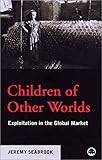Children of other worlds : exploitation in the global market
Material type: TextLanguage: English Publication details: London : Pluto Press, 2001.Edition: 1st edDescription: vi, 166 p. ; 23 cmISBN:
TextLanguage: English Publication details: London : Pluto Press, 2001.Edition: 1st edDescription: vi, 166 p. ; 23 cmISBN: - 9780745313917
- 331.31 SEA
| Item type | Current library | Collection | Call number | Status | Date due | Barcode |
|---|---|---|---|---|---|---|
 Text Books
Text Books
|
CUTN Central Library Social Sciences | Non-fiction | 331.31 SEA (Browse shelf(Opens below)) | Available | 43233 |
Gradualist approach 151 -- of slave trade 2 -- of slave trade 3 -- of slave trade 14 -- Abu Dhabi 138 -- adulthood, effects of child labour 112-16 -- Africa, migrant workers 9 -- agricultural revolution 56-7 -- agricultural work -- child labour 23-4 -- child labour 56 -- child labour 71-3 -- child labour 74-5 -- child labour 77 -- hazards 73 -- Alam, Shahid-ul -- 118 -- 119 -- 120 -- Amazon 67 -- America, cotton mills 15-16 -- amphetamines 8 -- apprentices -- 4 -- 15 -- 122-3 -- unpaid 42-3 -- unpaid 69-70 -- unpaid 76 -- unpaid 122 -- Aries, Philippe 80-1
Association for the Realisation of Basic Needs 153 -- Awami League government -- 35 -- 60 -- banana selling 119 -- Bangabazar 107 -- Bangladesh -- activists 57 -- and conception of childhood 80-1 -- and global economy 32 -- and global economy 38 -- and global economy 49 -- and Harkin Bill 21-2 -- and inequality 28 -- and inequality 31-2 -- and inequality 33 -- and inequality 34 -- and protection of children 18 -- begging 94-5 -- begging 133-4 -- begging 135 -- begging 143 -- child labour 5 -- child labour 28-9 -- child labour 64 -- child labour 121-8 -- disabled people 31
Domestic servants 98-103 -- economic expansion 67 -- education 30-7 -- education 39-40 -- education 52 -- education 112 -- education 125 -- factory working conditions 16 -- factory working conditions 27-8 -- factory working conditions 33-4 -- factory working conditions 76-7 -- factory working conditions 125 -- garment factories 7 -- garment factories 16 -- garment factories 27-8 -- garment factories 76-7 -- garment factories 142 -- garment factories 143 -- health 34-5 -- health 36 -- health 45 -- health 60 -- hospitals 36 -- housing 35 -- housing 36 -- housing 124
Housing 154 -- life expectancy 148 -- living conditions 35 -- living conditions 36 -- living conditions 61 -- living conditions 124 -- migration 10-11 -- migration 24-5 -- migration 44 -- migration 84 -- migration 85 -- migration 112-13 -- orphans 55 -- orphans 94-6 -- orphans 108 -- poverty 34-5 -- poverty 36 -- street children 31 -- street children 55 -- street children 94-5 -- street children 107 -- street children 129 -- treatment of poor 25-6 -- wealth creation 19 -- Bangladeshi National Party 35 -- Barbados 14 -- Barisal -- 77 -- 84-9 -- migration from 27
More than 40,000 children die daily in the developing world from avoidable sickness and disease. Tens of millions of children labour in mines, mills and sweatshops, or scavenge for a living on city streets and dumps. In the so-called developed world, children's lives are similarly blighted by drugs, alcohol, sexual abuse and violence.Children of the rich are unhealthily obsessed with consumerist desires while children of the poor suffer from lack of opportunity. The global market is responsible for both of these ills.In Children of Other Worlds Jeremy Seabrook examines the international exploitation of children and exposes the hypocrisy, piety and moral blindness that have informed so much of the debate in the West on the rights of the child. Seabrook insists that the whole question of protecting children's rights must take into consideration the structural abuses of humanity that are inherent in globalisation.


There are no comments on this title.